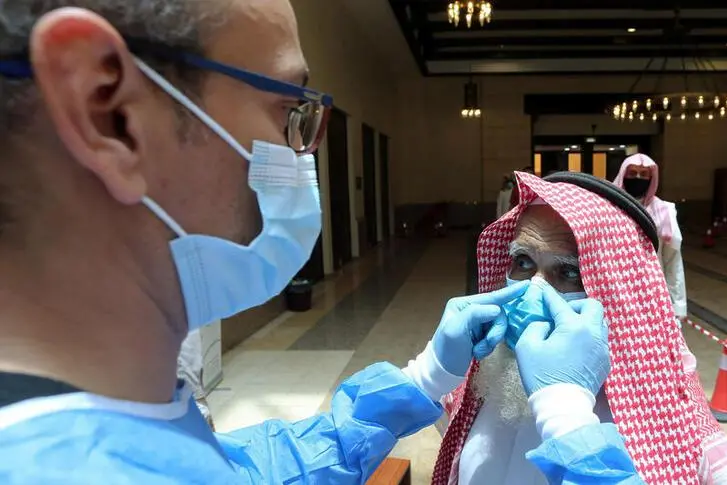PHOTO
JEDDAH: Social distancing may have helped curb the spread of COVID-19 in Saudi Arabia, but it has left one of the Kingdom’s most vulnerable groups — the elderly — at risk of loneliness, isolation and depression, experts believe.
As the pandemic hit countries across the globe, Saudi Arabia, with its strong family bonds and sense of kinship, faced an added challenge from measures limiting social activity and encouraging the elderly to stay at home.
According to Dr. Aisha Karman, a psychologist and life coach, the consequences for the Kingdom’s aged population have been severe, with many carrying psychological burdens, such as feeling lonely and unwanted.
Family members also have been faced with a difficult choice of whether to visit elderly relatives.
Those worried about aged relatives’ well-being, but too frightened to visit, have been left in an “impossible position,” she told Arab News. However, the elderly “are in constant need of a certain type of love and care, and often neglect their own health in desperation,” Karman said.
Safety precautions should be followed, “but this does not mean we cannot visit or ask about them,” she added. “The elderly can face psychological issues because they feel unproductive, and family members sometimes think avoiding them is best,” she said. “But they still need love and care. Psychological and emotional resilience is what keeps us going in life, whether we’re young or old.”
Saudi physical therapist Rahaf Meer was one of many who faced the moral dilemma of visiting an older relative. Meer’s grandmother suffers from Alzheimer’s and misinterpreted restrictions intended for her safety as neglect. “I started thinking, ‘what’s worse? Not knowing if I’m a silent carrier — even though I tested negative — and possibly harming her? Or not visiting her at all because I’m paranoid? She is old and we are not promised tomorrow,” Meer told Arab News.
“I visited her so she wouldn’t be alone and she is starting to forget the people around her. I used to video call her and remind her: ‘It’s me, Rahaf.’ It’s different when I visit her for some reason; she immediately recognizes me.
“But she still asks me why I sit so far away from her, and asks her caregiver to push her wheelchair closer. She wonders why I won’t eat with her and tells me to sit nearer. It breaks my heart every time I reject her simple request,” Meer added.
Those fortunate enough to live with their family members say the pandemic restrictions have had less impact. Jawaher Ghazzawi, a grandmother, lives with her two of her daughters and is happy she is not living alone. “I am scared to go out. I hate wearing a mask and I can’t handle breathing through it. My sons come to visit me and keep their distance. I haven’t gone outside my house for six months,” she told Arab News. However, despite her fear, she cannot go without seeing her grandchildren.
“I am emotionally exhausted, but I’m happy my sons and grandchildren come to visit. My grandchildren run to hug me and my son says: ‘No, don’t hug your grandmother.’ I tell him to let them. We must not let children go through any distress.”
Ghazzawi said the doctors’ warning that the elderly were most at risk from the “affected me emotionally. Ramadan and Eid Al-Fitr passed and I didn’t spend them with brothers and sisters. All we have to do is be patient.”
Abdul Aziz Al-Kinani, an infectious diseases specialist and attending resident at the King Abdul Aziz Airport health facility, said safety precautions have become a part of people’s everyday lives and, if done correctly, there is no need for panic.
“Many elderly complain that their relatives aren’t visiting them. But the reason is the visitor worries he or she might pass the virus on,” he said.
“Just as we prepare to go out to malls or restaurants following the safety precautions, we can do the same when visiting the elderly.
“The precautions should be normal but in line with safety measures. Masks, sanitizers, all health precautions became part of our lifestyle. They are easy steps to follow and are not an excuse to avoid visiting elderly relatives,” Al-Kinani said. “If everyone is following the precautions, there is no reason to be afraid.”
Copyright: Arab News © 2020 All rights reserved. Provided by SyndiGate Media Inc. (Syndigate.info).





















